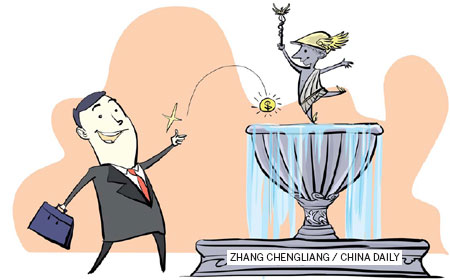Why China can bring lasting riches
Updated: 2013-07-05 09:47
By Mike Bastin (China Daily)
|
|||||||||||


Cross-cultural understanding is critical if big business partners are to develop that special relationship
Summer has arrived in Europe, but in the economic environment there are few bright spots across the continent. With rising unemployment and no signs of growth, there is little in the way of optimism among European consumers and businesses who remain decidedly downbeat about the future.
However, this apparent vote of no confidence stands in stark contrast to the waves of investment that continue to roll in from China and wash up on European shores.
Investment flows from China into Europe last year reached $12.6 billion, an increase of 21 percent on 2011. Even more encouragingly for Europe, these sizeable and growing sums are not just targeting natural resources but a vast array of business opportunities right across the manufacturing sector, from industrial to consumer goods and services.
Earlier last month, for example, China's Hong Kong-based Goldin Group snapped up three of the most prestigious Bordeaux chateaux: Bertineau St Vincent; Bon Pasteur; and Rolland-Mallet. The sum paid remains undisclosed but is believed to be around the $10 million mark. Even more recently, China's Fosun International, the investment arm of a major Chinese conglomerate, and its French partner, Axa Private Equity, appear to be in the process of a spectacular $700 million buyout of France's Club Med. This is easily the biggest European deal in recent years.
What makes this even more encouraging for Europe is the strategic nature of many of these investments. Chinese companies appear not to be seeking to secure a quick, short-term financial kill by some strategy of acquisitive asset-stripping mergers and acquisitons. On the contrary, in many instances European management remains entirely in place and long-term expansion of the European business across China appears to be a key part of any deal. Hence, the rhetoric from Fosun on growth opportunities of the Club Med brand in China.
While this may seem to be a genuine sign of economic upturn, this will only be the case if the majority of these Sino-Euro tie-ups work well in the long term. Any apparent short-term financial gain must not be used to mask what are undoubtedly major cross-cultural issues. Cultural misunderstanding and a lack of real cultural integration are often cited as the reasons behind cross-border M&A failures. Indeed, roughly six out of every 10 mergers and acquisitions do not achieve anything like the success envisaged at the time of takeover.
Long-term success, therefore, will rely on cultural awareness and the ability to learn about and adapt to different business cultures.
In my experience dating back to the mid-1990s as a business trainer and consultant in and on China, it is clear that many European managers have a reasonable understanding of Chinese business culture. Most have experience of lengthy negotiations with their Chinese business partners, often over dinner and accompanied by copious quantities of alcohol. Chinese concepts such as "face" and guanxi are also familiar to more and more Europeans.
But what is not clear on the European side is the desire of current and aspiring Chinese business professionals to acquire knowledge and experience of Western business principles and practices. The lack of knowledge and experience on the Chinese side must be addressed in the short term if long-term success is to be achieved.
Therefore it behoves European businesses not just to increase their awareness and understanding of Chinese business culture and to place partnerships with Chinese enterprises at the heart of their corporate strategy, but also to develop the capability to educate and train Chinese employees, at all levels, in all aspects of business and management.
Europeans will be surprised to find not inconsiderable enthusiasm among their Chinese partners for professional training. A mere glance at the growing numbers of Chinese students on overseas business and management university degree courses and training programs will confirm this enthusiasm.
Any formal or even informal business and management education and training provided by a European organization to employees of its Chinese partner will play a huge part in any long-term success and will be highly valued symbolically by the Chinese.
The design and delivery of any such business education and training by the European side are also crucial to success. Unlike many aspiring European business professionals, the Chinese equivalents value very highly the acquisition of business qualifications, awarded by prestigious European universities and training organizations. In-house education and training provided by European business partners is also highly valued, especially when accompanied by some form of certification.
Chinese companies are not only seeking European partners for business development reasons in Europe but also for expansion across Asia, and China in particular. Hence the Shanghai-based Bright Food Group's recent acquisition of British cereal brand Weetabix. With markets in Europe remaining sluggish at best, this is very good news for European industry. Any plans for China though also require important input from the European side, particularly in the area of business and management education and training. Chinese companies still lack an appreciation of the importance of regular, professional training across all aspects of business and management. It is also the case that the best education and training providers in China are dominated by the Chinese branches of European and US training and consulting organizations.
Any business expansion in China enjoyed by a Sino-European corporate tie-up will inevitably require recruitment and training of talented and aspiring Chinese business professionals. A partnership with a high-quality professional China-based training and consulting organization is essential to identify and select the best candidates.
Sino-European corporate tie-ups and takeovers will continue, with some observers estimating that by 2020, Europe might be receiving as much as $250 billion to $500 billion cumulatively in new Chinese M&A and green-field investment. However, only those European firms that take the education and training initiative with long-term investment in all areas of business and management development will enjoy long-term competitive success with their Chinese partners.
Finally, there was further evidence of Chinese companies' thirst for skills and knowledge through tie-ups with European industry during the Third Global Think Tank Summit in Beijing. Easily top of the agenda was the discussion about new "wheels" of growth for the Chinese economy. During this two-day event, a host of top Chinese business leaders all relished the prospect of a much-needed move away from the current low-cost investment business model. Speaker after speaker not only outlined the necessary change to a more modern approach to business with emphasis on teamwork, long-term investment, high-quality branded products and a culture of innovation running right through any organization, but also pointed firmly in the direction of Europe as the way forward. Long-term Sino-Euro corporate relationships were presented as crucial to facilitating this transition.
European companies should, therefore, have nothing to fear from the international expansion of Chinese organizations, and everything to gain. In fact, it is probably the Chinese side which is most nervous and in need of encouragement and assistance.
The phrase "special relationship" has often been used to refer to all types of co-operative US-UK engagement. However the gradual and inexorable decline in US hegemony will undoubtedly lead to it being used far less frequently.
The opportunity now lies with Europe and European industry to establish a "special relationship" with China and Chinese corporations. In so doing, a symbiosis could result which will underpin lasting economic riches.
The author is a visiting professor at the University of International Business and Economics in Beijing and a researcher at Nottingham University's School of Contemporary Chinese Studies. The views do not necessarily reflect those of China Daily.
( China Daily European 07/05/2013 page11)
Today's Top News
List of approved GM food clarified
ID checks for express deliveries in Guangdong
Govt to expand elderly care
University asks freshmen to sign suicide disclaimer
Tibet gears up for new climbing season
Media asked to promote Sino-Indian ties
Shots fired at Washington Navy Yard
Minimum growth rate set at 7%
Hot Topics
Lunar probe , China growth forecasts, Emission rules get tougher, China seen through 'colored lens', International board,
Editor's Picks

|

|

|

|

|

|





